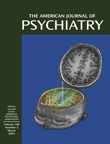Association of Comorbid Posttraumatic Stress Disorder and Major Depression With Greater Risk for Suicidal Behavior
Abstract
OBJECTIVE: Posttraumatic stress disorder (PTSD) increases the risk of suicidal behavior; a major depressive episode also increases the risk for suicidal behavior. The authors’ goal was to examine the effect of comorbid PTSD and major depressive episode on suicidal behavior. METHOD: Inpatients with a diagnosis of major depressive episode (N=156) were assessed for PTSD, suicidal behavior, and clinical risk factors for suicidal acts. RESULTS: Patients with comorbid major depressive episode and PTSD were more likely to have attempted suicide, and women with both disorders were more likely to have attempted suicide than men with both disorders. Cluster B personality disorder and PTSD were independently related to history of suicide attempts. CONCLUSIONS: The greater rate of suicide attempts among patients with comorbid PTSD and major depressive episode was not due to differences in substance use, childhood abuse, or cluster B personality disorders.



